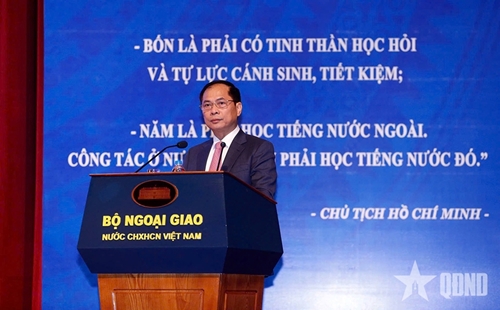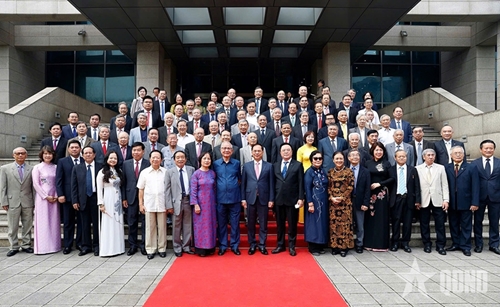July 29, 2025 | 23:55 (GMT+7)
Diplomacy helps boost Vietnam’s regional and global integration
PANO – On July 28 in Hanoi, the Ministry of Foreign Affairs held a seminar titled “Diplomacy in the Ho Chi Minh era: 80 years of dedicated service to the nation,” marking a significant event in the series of activities to celebrate the 80th anniversary of the establishment of Vietnam’s diplomatic service (1945-2025).
Delivering the opening remarks, Deputy Prime Minister and Minister of Foreign Affairs Bui Thanh Son affirmed that throughout the struggle for national liberation, diplomacy, together with military and political fronts, served as a strategic battlefield that helped turn victories on the ground into success at the negotiating table. Following the country's reunification, diplomacy played a vital role in the peaceful reconstruction and expansion of Vietnam’s foreign relations under the policy of independence, self-reliance, multilateralization, and diversification, for peace, cooperation, and development.
    |
 |
|
Deputy Prime Minister and Minister of Foreign Affairs Bui Thanh Son addressing the event |
Diplomacy has also helped facilitate Vietnam’s deep integration into the region and the world. From being isolated and embargoed, Vietnam has now established diplomatic ties with 194 countries, strategic and comprehensive partnerships with 37 nations, and is an active member of over 70 international and regional organizations. For international friends, Vietnam is not only seen as a successful developing country, but also a trustworthy and responsible partner.
    |
 |
|
Delegates attending the seminar pose for a joint photo. |
During the seminar, delegates presented papers summarizing practical lessons and developing theories on modern Vietnamese diplomacy, with particular emphasis on inheriting President Ho Chi Minh’s diplomatic thought. They also discussed lessons in handling relations with major powers and the need to promote the synergy of Party diplomacy, State diplomacy, and people-to-people diplomacy. Based on these insights, the seminar proposed directions to develop a comprehensive, modern, and professional diplomacy imbued with national identity in the new era.
Translated by Trung Thanh